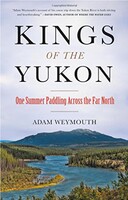Book notes: Kings of the Yukon
May 21, 2025
By Adam Weymouth.
I found this book at the end of a Internet rabbit hole. While preparing for a trip to Banff this spring I noticed that the Columbia river headwaters was in the next valley over to the West. Whoa, the Columbia river went that far inland? I found this fantastic 33 day Canoe trip of the entire Columbia River. I’ve been curious to float many of the rivers in Washington and this made me more aware of what is possible. In searching for more accounts of these types of things the Seattle City Library recommended “Kings of the Yukon”.
Scoring:
- Axe for the frozen sea: 10/10.
- Page count: 268, effective page count: about that.
The author floated the length of the Yukon river, mostly by canoe, and I really enjoyed going along for the ride with him. The author was interested in learning about the plight of the king (chinook) salmon and it’s affect on the people and economy of the Yukon river. He started at McNeil lake, in Yukon, Canada, which is believed to be the end of the longest salmon run in the world. 1990 miles. It actually took the author 2 summers to float the entire length, which the author notes is embarrassing, because the salmon do it in 1 summer, averaging 50 miles/day, upstream, without the benefit of 3 meals a day.
If you came for the adventure and salmon, you may have stayed to hear the stories from people the author meets along the way. Salmon used to support a vibrant economy along the Yukon, but since the collapse of the king salmon run many years ago, a lot of the population has moved to cities to find work. A man he met near Eagle had his house washed away by a big flood. He met an 84 year old woman near the end of the trip that was part of the native american family separation policy.
There is still subsistence fishing for kings, but everyone seems to agree that most king salmon fishing needs to stop, and will likely take 100 years to recover.
Lots of salmon trivia:
- The king salmon start off the run near the ocean fat and oily, and end the run lean and dry. Everybody on the Yukon prefers the salmon the way it is when it shows up in their part of the river.
- Pacific salmon are geographically isolated from Atlantic salmon, but as the world warms they both are migrating North. Currently they are only separated by ~2k miles, but they will eventually meet and nobody is sure what will happen. Will one decimate the other?
- The last salmon was caught in the Thames river (London) in 1833. Some salmon have returned to Sheffield, UK and Portland, OR, as rivers are cleaned up.
- To find their original river for spawning, salmon have some kind of magnetic material in their brain for navigation aid. They also have very sensitive taste for freshwater from their river.
- The forests are fed by salmon. The salmon swim upstream, get eaten by all the animals, and pooped out as fertilizer all around the forest. Decline in forest health can probably be attributed to decline in salmon.
- Hatchery salmon don’t help the wild salmon population: they compete for food and not one hatchery salmon has ever been found to go back up river to spawn. (They swim out into the ocean and don’t come back.)
What about bears? Right? In the later part of the summer the bears come to the river to eat. The author set up camp in the evening on islands in the middle of the river. A grizzly came pretty close to them once, but otherwise they didn’t have any notable encounters.
This book is a must read and a keeper for the book shelf. If you only read 1 book about Alaska, prefer Coming Into the Country, by John McPhee. Mr Weymouth references his work but I didn’t note the page number.